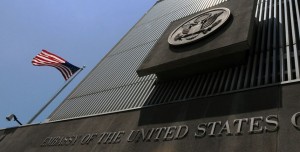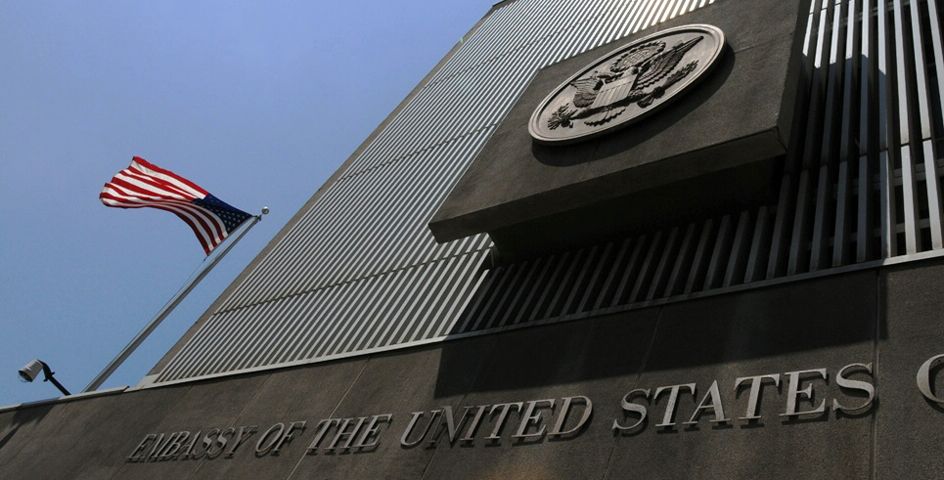 “It is unfortunate that the entire Democratic Party has embraced President Obama’s shameful refusal to acknowledge that Jerusalem is Israel’s capital,” declared Mitt Romney on September 4.
“It is unfortunate that the entire Democratic Party has embraced President Obama’s shameful refusal to acknowledge that Jerusalem is Israel’s capital,” declared Mitt Romney on September 4.
The deletion of a single sentence about Jerusalem in the Democratic platform, which reportedly had been vetted by officials from the American Israel Public Affairs Committee (AIPAC), generated hysterical headlines that went viral and ricocheted throughout cyberspace, arousing panic among Democrats and glee among Republicans. (The Democrats reinserted the language on September 5 after President Obama “intervened directly“.)
Ironically, affirming Jerusalem’s status as the capital of Israel and the importance of relocating the US Embassy from Tel Aviv to Jerusalem has been a largely Democratic strategy for nearly four decades, particularly when there has been an incumbent Republican president in the White House. Republicans latch on to it whenever a Democratic president is running for re-election.
Now for some historical perspective.
The Democratic party’s 1976 platform was the first to stipulate:
We recognize and support the established status of Jerusalem as the capital of Israel, with free access to all its holy places provided to all faiths. As a symbol of this stand, the U.S. Embassy should be moved from Tel Aviv to Jerusalem.
This stance was reiterated in the 1980 and 1984 platforms. In 1983, Sen. Daniel Patrick Moynihan called for relocating of the US Embassy to Jerusalem, in a bill co-sponsored by fifty senators. When State Department officials in the Reagan administration objected that moving the Embassy would strain diplomatic ties with Arab countries, Moynihan did not press for a vote. No mention of Jerusalem whatsoever was made in the Democratic platform in 1988, in the wake of Secretary of State George Shultz’ssharp criticism of Democratic candidate Michael Dukakis for suggesting that, if elected President, he would consider transferring the Embassy to Jerusalem. “It’s shocking that anybody would make such a proposal,” the Reagan administration’s chief spokesman on foreign policy told NBC’s Today show. Since Jerusalem, the West Bank, the Gaza Strip and the Golan Heights “are regarded as occupied territory” and are “subject to negotiations” according to Shultz, who deemed any notion of moving the Embassy a “mistake.”
But Jerusalem was back in the 1992 Democratic platform, a seeming non sequitur tacked on to the Middle East Peace plank, minus the call for moving the US Embassy:
The United States must act effectively as an honest broker in the peace process. It must not, as has been the case with this Administration, encourage one side to believe that it will deliver unilateral concessions from the other. Jerusalem is the capital of the state of Israel and should remain an undivided city accessible to people of all faiths.
Republicans were the latecomers to the Jerusalem capital-ism game. The GOP’s 1976 platform made no mention of Jerusalem. The 1980, 1984 and 1988 Republican platforms all declared that “Jerusalem should remain an undivided city with continued free and unimpeded access to all holy places by people of all faiths.” The same assertion appeared in the 1992 platform, followed by the coy sentence, “No genuine peace would deny Jews the right to live anywhere in the special city of Jerusalem.”
With a popular Democratic president in the White House, it was the Republicans’ turn to play the Jerusalem capital card. On October 24, 1995, the Jerusalem Embassy Act, introduced by Republican Sen. Bob Dole (who just happened to be running for president), passed the Senate (S. 1322) in a 93-5 and the House (H.R. 1595) 374-37. President Clinton signed the bill two weeks later. The overwhelming bi-partisan support for the measure did not prevent Republicans from taking full credit, gloating in the 1996 GOP platform:
We applaud the Republican Congress for enacting legislation to recognize Jerusalem as the undivided capital of Israel. A Republican administration will ensure that the U.S. Embassy is moved to Jerusalem by May 1999.
Clinton won the 1996 election. The US Embassy stayed in Tel Aviv. Then the 2000 Republican platform became even more strident:
The United States has a moral and legal obligation to maintain its Embassy and Ambassador in Jerusalem. Immediately upon taking office, the next Republican president will begin the process of moving the U.S. Embassy from Tel Aviv to Israel’s capital, Jerusalem.”
Nevertheless the Republican presidential candidate George W. Bush, who had publicly pledged to thousands of attendees at AIPAC’s 2000 Annual Policy Conference that on his first day in office he would move the US Embassy to Jerusalem, did not do so after winning the election. Not on his first day, not on his last day, and at no point in between. The Republican platform in 2004 stayed low key, noting, “Republicans continue to support moving the U.S. Embassy from Tel Aviv to Israel’s capital, Jerusalem.”
Democrats stuck with their tried-and-true 1992 formulation in 1996, in 2000, in 2004, and in 2008, reiterating the city’s status as Israel’s capital and the right of people of all faiths to access it. Ironically, Republicans framed their mega-affirmation of Jerusalem being Israel’s capital in 2008 with an endorsement of the creation of a Palestinian state, which went largely unnoticed by the media:
“We support the vision of two democratic states living in peace and security: Israel, with Jerusalem as its capital, and Palestine…We support Jerusalem as the undivided capital of Israel and moving the American embassy to that undivided capital of Israel.”
Two democratic states living side by side! Uri Friedman points out that such language “provoked a raft of amendments arguing that, in endorsing the two-state solution, the Republicans were dictating the terms of a peace agreement to the Israeli government.”
Israelis have for the most part been amused by, even cynical about, the overblown rhetoric about Jerusalem in US elections. As Douglas Bloomfield explained four years ago, when GOP presidential candidate John McCain told CNN’s Wolf Blitzer that if elected president he would move the US Embassy “right away,” not only wasn’t it going to happen — regardless of who was elected — but Israelis wouldn’t care either way:
Moving the embassy has never been a high priority for any Israeli leader in meetings with American presidents. They see it as a political football in an American game they prefer staying out of. All recent prime ministers have understood that an agreement on Jerusalem is critical to any peace settlement with the Palestinians – and that symbolic action like American politicians trying to force the embassy move can only make an agreement more elusive. But the game continues even though seasoned political observers understand it’s a sham. This year is no exception. Any politician who tells you he’s going to move the embassy before the Israelis and Palestinians come to an agreement on the city’s final status and borders thinks you’re wearing a name tag that says “chump.”
No prominent Democrat seems to know why the reference to Jerusalem was deleted in 2012. What is certain, however, is the fact that for the past 35 years the role of Jerusalem in both party platforms has had no practical effect in Israel, except perhaps to distract from — and thus implicitly condone — the unilateral Israeli tripling in size of the area within the municipal boundaries of “united Jerusalem” between 1967 and today. Politicizing the holy city has been one way that both American parties have tried to score points against the opposition, a distraction from more complex and urgent issues in US domestic and foreign policy. This year is no exception.
Meanwhile, Republicans seem to have soured on their “Embassy Sweets” commitment to moving the US Embassy to Jerusalem. That the 2012 GOP platform has dropped the call for the Embassy’s relocation has gone almost totally unnoticed by the ever-distracted media, except, oddly, by the Wall Street Journal.
Apparently Romney didn’t get the memo.






Great summary Marsha. It will be useful to me in my work. One omission ,unless I missed it: The Embassy Act conains the proviso that the Pres. may make an exception for nat’l security reasons.
The only candidate (failed) was Gigrich who promised to move it on day one of his presidency
Since the act is law; that exception must be made yearly n’est pas?
Due to length limits, it is always difficult to go into all aspects and considerations with regard to any issue that I write about. I am delighted when my Lobe Log readers bring up points that I was unable to in the article itself. You are correct insofar as the president has the prerogative of informing Congress that he is suspending implementation of the Jerusalem Embassy Act of 1995 in order to protect the national security interests of the U.S., but he must do so every six months (rather than once a year).
This is somewhat similar to an opinion piece few days ago by Aaron David Miller although Marsha and Aaron belong to diametrically opposite political camps. I tend to disagree that party platforms do not matter. I invite you to read a fascinating article by Rafael Medoff in LA Times 8/23 with the title The Jewish vote as a factor in US politics. In 1944 both parties’ conventions adopted a resolution supporting colonizing of Palestine and creation of state of Israel. Truman acted exactly on his party’s platform when he recognized state of Israel immediately and opposed repatriation of Palestinian refugees – a mistake of historic proportions. More disturbing than Jerusalem is the insistence of each party that refugees do not return to Israel, this in contravention of article 3 of universal declaration of human rights and international treaties. Unfortunately, what is in a party’s convention is more than likely to become US policy one day.
It’s not for nothing that Deval Patrick called for Democrats to “grow a backbone.” Nor is it unusual that Mike Lofgren thinks Democrats are as useless as Republicans are crazy.